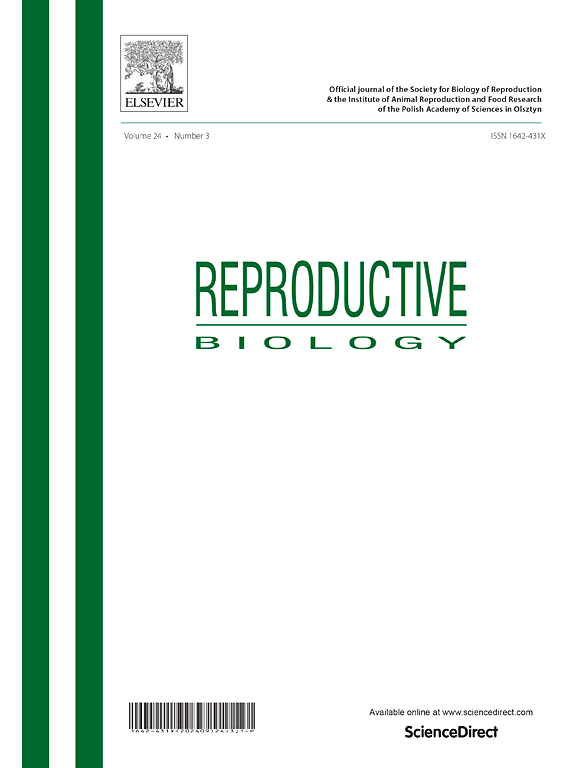基于RNA测序的脱个体化基因表达研究内参基因的选择与验证
IF 2.5
3区 生物学
Q3 REPRODUCTIVE BIOLOGY
引用次数: 0
摘要
脱个体化是一个多步骤和复杂的生理过程,用于帮助着床胚胎的发育。迄今为止,调节去个体化的潜在基因尚未被阐明。逆转录定量聚合酶链反应(RT-qPCR)广泛应用于基因表达研究,相对定量方法因其简单、成本效益高、样品要求低而成为主要方法。这种方法通过规范化参考基因来确定基因表达水平。然而,选择稳定的内参基因用于脱个体化研究仍然是一个挑战。基于人子宫内膜基质细胞(ESCs)和分化ESCs (DESCs)的RNA-seq数据集,确定了10个新的候选内参基因。通过RTqPCR检测这10个候选基因以及常用的内参基因β-肌动蛋白在ESCs、DESCs和蜕质细胞(DSCs)中的表达。采用5种算法系统地筛选合适的内参基因。结果表明,Staufen双链RNA结合蛋白1 (STAU1)在体外诱导脱体细胞化中最稳定,在ESCs和dsc中表达一致。以STAU1为参比基因,DESCs中胰岛素样生长因子结合蛋白1和催乳素的表达水平明显高于ESCs。在自然妊娠和人工诱导脱胎小鼠模型中进一步验证了Stau1。基于生物信息学分析,我们还提出kelch样家族成员9和TSC复合体亚基1可能作为额外的内参基因。我们的发现为子宫内膜去个体化的基因表达研究提供了有价值的见解。本文章由计算机程序翻译,如有差异,请以英文原文为准。
Selection and validation of reference genes for gene expression studies of decidualization based on RNA sequencing
Decidualization is a multistep and complex physiological process used to aid the development of an implanting embryo. To date, the potential genes regulating decidualization have not been elucidated. Reverse transcription quantitative polymerase chain reaction (RT-qPCR) is widely used in gene expression studies, with relative quantification being the predominant method due to its simplicity, cost-effectiveness, and lower sample requirements. This method determines gene expression levels by normalizing to reference genes. However, the selection of stable reference genes for studies on decidualization remains a challenge. Based on the RNA-seq dataset from human endometrial stromal cells (ESCs) and differentiated ESCs (DESCs), ten new candidate reference genes were identified. The expression of these ten candidates, along with the commonly used reference gene β-actin, was measured in ESCs, DESCs, and decidual stromal cells (DSCs) through RT![]() qPCR. Five algorithms were used to systematically identify suitable reference genes. The results indicated that Staufen double-stranded RNA binding protein 1 (STAU1) was most stable for induced decidualization in vitro, showing consistent expression in ESCs and DSCs. Using STAU1 as the reference gene, the expression levels of insulin like growth factor binding protein 1 and prolactin in DESCs were significantly higher than those in ESCs. Stau1 was further validated with both natural pregnancy and artificially induced decidualization mouse models. Based on our bioinformatics analysis, we also propose that kelch like family member 9 and TSC complex subunit 1 may serve as additional reference genes. Our findings offer valuable insights for gene expression studies of endometrial decidualization.
qPCR. Five algorithms were used to systematically identify suitable reference genes. The results indicated that Staufen double-stranded RNA binding protein 1 (STAU1) was most stable for induced decidualization in vitro, showing consistent expression in ESCs and DSCs. Using STAU1 as the reference gene, the expression levels of insulin like growth factor binding protein 1 and prolactin in DESCs were significantly higher than those in ESCs. Stau1 was further validated with both natural pregnancy and artificially induced decidualization mouse models. Based on our bioinformatics analysis, we also propose that kelch like family member 9 and TSC complex subunit 1 may serve as additional reference genes. Our findings offer valuable insights for gene expression studies of endometrial decidualization.
求助全文
通过发布文献求助,成功后即可免费获取论文全文。
去求助
来源期刊

Reproductive biology
生物-生殖生物学
CiteScore
3.90
自引率
0.00%
发文量
95
审稿时长
29 days
期刊介绍:
An official journal of the Society for Biology of Reproduction and the Institute of Animal Reproduction and Food Research of Polish Academy of Sciences in Olsztyn, Poland.
Reproductive Biology is an international, peer-reviewed journal covering all aspects of reproduction in vertebrates. The journal invites original research papers, short communications, review articles and commentaries dealing with reproductive physiology, endocrinology, immunology, molecular and cellular biology, receptor studies, animal breeding as well as andrology, embryology, infertility, assisted reproduction and contraception. Papers from both basic and clinical research will be considered.
 求助内容:
求助内容: 应助结果提醒方式:
应助结果提醒方式:


